Home » Jazz Articles » Bailey's Bundles » July 2022: Love Of The Tiger
July 2022: Love Of The Tiger

Courtesy Shervin Lainez
 Dida Pelled
Dida Pelled Love Of The Tiger
Self Produced
2022
Jazz singing is seeing an uptick of artists stepping out of their "traditional" roles into dramatically different vocal genres altogether. Mainstream-to-progressive Kristina Koller, who debuted in 2017 with the youthful and forward-thinking Perception (Self Produced) followed that effort with the hard-left turn of Stronger (Self Produced, 2019), on which Koller seizes the feet of the musical arts, shaking the change from its pockets. Now, we have the Tel-Aviv-born, Brooklyn-based singer/guitarist Dida Pelled following her two traditional organ-and-guitar outings (Plays And Sings (Red Records, 2011) and A Missing Shade Of Blue (Red Records, 2016) with the dangerously entertaining and hyper-contemporary Love Of The Tiger. Love Of The Tiger plays musical hopscotch with hip hop, rhythm & blues, and adult contemporary (turned on its ear) leaving jazz AMA for parts unknown.
In the welcome process of going rogue, Pelled redefines her voice from the 1930s standards coquette to a solution of Norah Jones, Rickie Lee Jones, and Sarah Shook (without the Piedmont patois). Her songwriting is dense lightheartedness painted on pure darkness as heard in the sarcasm of "I Thought You Were Kidding," the deep relief of letting go in "Sylvia (Lost Her Sense of Being A Woman)," and the corrosive indictment of "Smooth Talking Con Man" all nestled in Pelled's deeply inventive music. This is a great new direction for an artist with an embarrassment of artistic riches.
Key Selection: "Skinny."
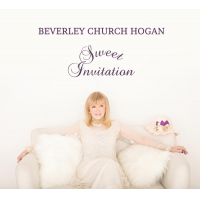 Beverly Church Hogan
Beverly Church Hogan Sweet Invitation
Cafe Pacific Records
2022
If Mark Winkler can be considered the Godfather of the SoCal jazz vocalist mafia, then Beverley Church Hogan is its benevolent Godmother. Extending this metaphor further, on Sweet Invitation, pianist and arranger John Proulx [Say It (Artist Share, 2018)] serves as Hogan's trusted consigliere, as he has for the past decade-plus as Hogan's accompanist; and having been on hand for the veteran singer's debut recording, Can't Get Out Of This Mood (Cafe Pacific Records, 2018). Hogan, having devoted a lifetime to family and business before having returned to music in the early 2000s as a grande dame of the art, is making her mark as a recording artist.
Sweet Invitation is a collection of Hogan's specialty, the mature romantic ballad: "Falling In Love With Love," "Here's That Rainy Day," and "When October Goes" all testify to her considerable abilities. Hogan's voice is a well-balanced instrument capable of expressions from sassy to pensive. Joining Hogan is the excellent multi-reedist Bob Sheppard who properly seasons the upbeat selections, "Don'Cha Go 'Way Mad," "Invitation," and "I'm Just Foolin' Myself" with his keen mainstream bop expertise. Kudos to bassist Lyman Medeiros for his robust soloing and drummer Clayton Cameron for his sharp timekeeping. Proulx's consistently high level of playing and arranging elevates the recording. Hogan's twilight is proving to be a bright and productive one. Let's hear some more!
Key Selection: "I'm Just Foolin' Myself."
 Dan Olivo
Dan Olivo Day By Day
Ave Maria Records
2022
In male jazz vocals, there are many Frank Sinatra devotees (too many to count) and few innovators living, Kurt Elling, Andy Bey, and Paul Jost being a shortlist. West Coast singer/actor Dan Olivo blends elements from these two camps in an amalgam focusing on the music and its presentation. Olivo's efforts are to effect a big band sound using a small ensemble. He does this with his childhood friend, guitarist Ian Robbins , who put together a modest band with a big sound whose center is the strategic drumming and cymbal work of Kevin Winard, who is given full dynamic and tempo control. Winard's percussion shimmers, filling all the empty space between Olivo and the rest of his crack band.
Olivo in no way tries to emulate the "Chairman of The Board" (Sinatra) or his favorite singer Tony Bennett). He does follow a path made by Michael Bublé, who comes from the Bing Crosby -Fred Astaire school of singing. Olivo has a pleasant, uncomplicated voice that welcomes the listener more than it challenges them, full of honesty and amiability. Suspended sonically above the assertive and confident playing of his supporting sextet, Olivo sings with great mettle and understatement, addressing a solid collection of standards that include the cover songs, "It Had To Be You," "Time After Time," a delightful "Sway" and "This Guy's In Love With You." This is Olivo's debut release. His future holds much promise.
Key Selection: "It's Only A Paper Moon."
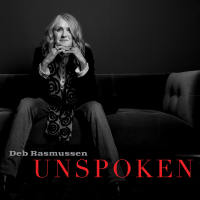 Deb Rasmussen
Deb Rasmussen Unspoken
Self Produced
2022
All hail breezy, well-conceived, and -presented jazz vocal collections. The COVID pandemic did a good thing in providing a stasis generously taken advantage of by the best of those who create art. Calgary singer Deb Rasmussen took full advantage of this time off. The project that would become Unspoken was an idea taking shape when everything in the world stopped, forcing the singer into an unplanned and equally unwelcome solitude. Blank time allows reflection, something Rasmussen used to reconsider material, original and standards. After a while, the singer contacted her pianist, Jon Day and the two used modern technology to create this recording, remotely.
Two years later the tangible results are this tautly conceived concept recording, using only a jazz trio, to present a program of the unspoken facets of romance and love. Along with bassist Jeremy Coates and drummer Robin Tufts, the resulting quartet creates a homogenous soundscape in both arrangements and sonics that creates an integrated whole, not unlike that realized in Jackson Browne's Late For The Sky (Asylum Records, 1974). Rasmussen positions "It Never Entered My Mind," "Darn That Dream," and "In Your Own Sweet Way" among the thematically similar originals ("Swept Away" and "Peace, Like A River"). The vocalist's excellent, measured singing is well supported by her band in creating and presenting a musical neighborhood where the allegory and simile of the lyrics come to life as soon as they are exhaled. Effortless swing and smart programming make this an excellent vocal recording.
Key Selection: "Darn That Dream."
 Sass Jordan
Sass Jordan Bitches Blues
Stoney Plain Records
2022
Canadian vocalists Sass Jordan raised eyebrows with 1992's Racine (UMG Recordings), swaggering into consciousness like a female Faces-era Rod Stewart. Contemporary with the Black Crowes, Jordan showed promise in ensuring that the spirit of Janis Joplin and her era remained alive and vibrant. This promising opening was followed by 25 years and five recordings of credible, yet unfocused music where it was difficult for Jordan to decide who to be. In 2017, Jordan released Racine Revisited, the original rerecorded with a generation of technology evolution and self-realization gained only by living and thereby finding herself bolder, better, and more authentic.
In 2020, Jordan released a blues cover album, Rebel Moon Blues (Stoney Plain), where she attacks the music with the raspy, slurred abandon of the whole of the 1970s. The singer arrives here fully realized and fully herself. Jordan follows with the present Bitches Blues, a collection of blues-infused rock originals and covers equally inspired as Rebel Moon Blues. Putting a high shine on Rick Derringer's "Still Alive And Well," Jordan's coda takes the song to the river for baptism. "Even" is a nine-bar blues propelled by Jesse O'Brien's barrelhouse piano, unusual for Jordan's typical guitar-dense approach. Mississippi Fred McDowell's "You Got To Move" is closer to the original than the Rolling Stones' version on Sticky Fingers (Rolling Stones, 1971). Not so with Lowell George and Little Feat's "Sailin' Shoes," where Jordan and band pull the song through a NOLA-cum-The Meters prism, creating a new song altogether. Sass Jordan is enjoying the attention she should have been all along.
Key Selection: "Sailin' Shoes."
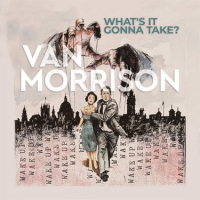 Van Morrison
Van Morrison What's It Gonna Take?
Exile Music
2022
Van Morrison (and Eric Clapton) have become political touchstones for their opposition to public health measures to contain the COVID-19 pandemic, and that is too bad. While art must necessarily comment on politics, it must also transcend the same, if the media allows it to do so. Why, in our present fashionably adolescent "cancel" culture, should any artist, and Morrison in particular, get a break? In the case of Morrison, he has exactly two creative peers: Ray Charles and Willie Nelson, all musicians proven able to, at the same time, transcend and assimilate different music genres at will, making each sound as if invented by them. On 2021's Latest Record Project, Vol. 1, Morrison had not focused his anger (read that as he was foaming at the mouth) regarding lost concert opportunities, muddling into paste an otherwise musically sound recording. On What's It Gonna Take?, Morrison, comes through with perhaps his best effort since 2005's Magic Time (Exile Music). While his opinions have not evolved, his always sharp musical acumen has.
Lyric content aside, Morrison's music has always been solid, regardless of what "phase" he may have been passing through. Presently, Morrison effects a taut, stripped-down sonic environment that evidences some of his favorite genre sources. His assembly of 15 compositions orbits the centers of American soul music: Memphis ("Dangerous"), Muscle Shoals ("Fighting Back Is The New Normal"), Detroit ("Not Seeking Approval"), Philadelphia ("It's My Stage Name"), and other parts unknown ("Fear And Self-Loathing In Las Vegas"). Morrison can make more out of two and three chords than others can with the whole harmonic shooting match. Musically, the singer remains always on point. While Armond White, writing in the
Key Selection: "Fear And Self-Loathing In Las Vegas."
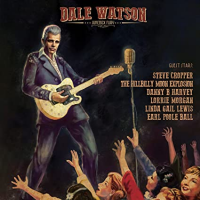 Dale Watson
Dale Watson Jukebox Fury
Cleopatra Records
2022
Country & western/rockabilly devotee Dale Watson interprets his favorite cover material in Jukebox Fury. His choice of songs is as compelling as his selections look and sound, which is like a personal playlist of an average late Baby Boomer born in the early '60s. The recital is compelling because Gordon Lightfoot's "Sundown" makes a strange bedfellow with Tony Joe White's "Polk Salad Annie," but, then again, no more than Michael Johnson's "Bluer Than Blue" and Buck Owen's "Act Naturally." Let there be no doubt, this is a Dale Watson recording. But, Watson gives up all guitar duties to Danny B. Harvey who extracts all the twang from his various guitars with deep reverb and compression. Watson is featured front and center as his baritone voice dispenses songs with an audible swagger.
Giving his regular band, the Lone Stars, time off, Watson is joined by several notable personalities: Linda Gail Lewis on "Always On My Mind," Steve Cropper on Roy Head's "Treat Her Right," and Lori Morgan on Waylon Jennings' "I've Always Been Crazy." Watson is most effective on the covers furthest from his specialty. He gives a near growling bite to "Sundown" while singing his best on "Bluer Than Blue." "Polk Salad Annie" works well enough, though Watson may have been better to have left it alone as his version is more aggressive and less nuanced than the original. There is nothing humidly sensual to his performance. It is a cover that sounds like a cover. On the other hand, Watson transforms America's "Horse With No Name" providing the original tune with a dense fortitude giving the classic rock confection some much-needed gravity. Jukebox Fury may be more fun than we deserve, but it is sure great to still have it.
Key Selection: "Sundown."
 Michael Korstick, ORF Vienna Radio Symphony Orchestra, Constantin Trinks
Michael Korstick, ORF Vienna Radio Symphony Orchestra, Constantin Trinks Beethoven: Piano Concertos 0-7
CPO
2022
If for scholarship and completeness only, German pianist Michael Korstick's survey of the "eight" Beethoven Piano Concertos would be notable. This "kitchen-sink scholarship" serves the artistic purpose here as it did when German clarinetist Dieter Klöcker allowed his informed imagination to run wild while recording a series of albums under the main title of ? Mozart! where Klöcker sought out every clarinet composition even suggested to be composed by the master and recorded them, figuratively saying "maybe it is...maybe it's not, but ain't the music great!" Korstick does the same thing with every piano concerto fragment penned by LVB, including Muzio Clementi's requested adaptation of the Violin Concerto, which was also successfully adapted for clarinet by Michael Collins and performed with the Russian National Orchestra under the baton of Mikhail Pletnev on Clarinet Concertos: Mozart & Beethoven (Deutsche Grammophon, 2006).
Korstick divines from the musical literature, count 'em, eight piano concertos (0-7): the original five, the violin concerto adaptation, an early E-flat major three movements, WoO 4 that smiles at Georg Frederick Handel by way of Mozart, and an unfinished, very classical sounding D major concerto (only the allegro movement realized) Hess Catalogue 15 which was previously fleshed out by British musicologist Nicholas Cook with a new cadenza and coda composed by Hermann Dechant. The playing and sonics are so fine in this collection that the source and its artistic validity are beside the point. Korstick's playing brims with brio and dance, spurned along by the ORF Vienna Radio Symphony Orchestra, directed by Constantin Trinks. We, as listeners, should heed Wordsworth's admonition in his preface to Lyrical Ballads, and accept a "willing suspension of disbelief" allowing oneself to enjoy the music.
Key Selection: "Piano Concerto in E-flat major, WoO 4."
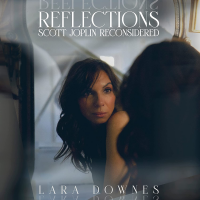 Lara Downes
Lara Downes Reflections: Scott Joplin Reconsidered
Rising Sun Music
2022
American composer Scott Joplin may be seen as many things. He is an evolutionary creative force binding Louis Moreau Gottschalk with Jelly Roll Morton and, therefore, ragtime to jazz. Joplin evinces "High Ragtime" in the same way Bach does "High Baroque." The two composers are further similar in that while they did not invent their respective genres, they did codify, and perhaps, perfect them, leading to a certain rigor they expected when their compositions were performed (Joplin insisting, in his instructions for playing "The Nonpareil,"—"Do not play this piece fast. It is never right to play Ragtime fast."). Joplin is quintessentially "American," whether, in the salad days of the twentieth century, America wanted him or not. Joplin is the collision between his piano teacher's European classicism, his father's plantation shouts, Gottschalk's Creole Caribbean vibe, and the hot dusty streets of Texarkana, Texas at the turn of the last century. He is the dawn of American classical music and it is time he is considered so: a sentiment shared by pianist Lara Downes.
Downes has been on a tear, weaving the social, cultural and musical together using the loom of African American experience. Her most recent recordings New Day Begun (Rising Sun Music, 2021) and Florence Price Piano Discoveries (Flipside Music, 2020) (many selections here also considered on Samantha Ege's recent Fantasie Nègre: The Piano Music of Florence Price (Lorelt, 2021)) bring attention to seldom heard African American artists deserving more attention. Downes sharpens her focus, directing it toward that American original Joplin. Her desire with Reflections is to present Joplin's music as elevated art suited for the performance hall, "classical" music, as it were, rather than barroom or movie soundtrack music. She accomplishes this with her solo performances, "Tremonisha: Prelude" and "Heliotrope Bouquet," being notable while she gives inventive and smiling small band treatment to "Maple Leaf Rag'' and "Magnetic Rag," which are delightful. Downes's playing style is more romantic than that of the didactic Josua Rifkin or the militant William Appling. She makes Joplin "sing." Downes is passionate and committed, both shining through her presentation of the American Scarlatti, Scott Joplin.
Key Selection: "Tremonisha: A Real Slow Drag."
 Noël Akchoté
Noël Akchoté Klavierstücke: Reading Alban Berg (1901-1908) (Classical For Steel Guitar)
Bandcamp
2022
The number one question here is, "When does Noël Akchoté sleep?" The French guitarist has been marching through the classical repertoire for the better part of his nearly 500 (and counting) releases present at his Bandcamp site. So quickly is the music posted that one cannot listen to the most recent release without it becoming the penultimate one. The guitarist's exceptionally melodic and accessible Franz Schubert— String Quartet N°. 1 (D.18, 1810) (Classical For Steel Guitar) (Bandcamp, 2022) remains fully ablaze when the present Klavierstücke: Reading Alban Berg (1901-1908) (Classical For Steel Guitar) shows up. Akchoté's stretch from Schubert to Berg is an impressive one.
Berg was perhaps the most accessible of the Second Viennese School of composers (that included Arnold Schoenberg and Anton Webern). His short life allowed him only a limited output, part of which Akchoté addresses here. Three examples of the composer's Jugendlieder are included with two brief piano pieces. Of the songs, "Wo Der Goldregen Steht" is masterfully wrought and well-served compared with Andreas Scholl and Tamar Alperin's performance on Twilight People (BMG, 2019). The guitarist bayonets the wounded in the song's interior, disintegrating into ravenous particles, before coming back around for a mostly well-behaved coda. An even better comparison is Akchoté's performance of "Klavierstück H-Moll" with that of Jean-Jacques Dünki on Alban Berg: Fruhe Klaviermusik, Sonata Op.1, Sonata Fragments & Variations (Jecklin Disco, 1975), where Akchoté attempts a creative explanation of Berg's 12-tone approach using a very schizophrenic method of emphasizing the muted elements of Dünki's performance. The effect is enjoyably educational.
Key Selection: "Wo Der Goldregen Steht (1901-1904, Jugendlieder)."
Tags
Bailey's Bundles
Dida Pelled
C. Michael Bailey
Mouthpiece Music
United States
Self Produced
Kristina Koller
Norah Jones
Rickie Lee Jones
Sarah Shook
Cafe Pacific Records
Mark Winkler
Beverley Church Hogan
John Proulx
Bob Sheppard
LYMAN MEDEIROS
Clayton Cameron
Ave Maria Records
Ian Robbins
Kevin Winard
Tony Bennett
Bing Crosby
Fred Astair
Deb Rasmussen
Jon Day
Jeremy Coates
Robin Tufts
Stoney Plane Records
Rod Stewart
Janis Joplin
Rick Derringer
Jesse O'Brien
Mississippi Fred McDowall
Lowell George
Exile Music
Van Morrison
Eric Clapton
Cleopatra Records
Dale Watson
Gordon Lightfoot
Tony Joe White
Michael Johnson
Buck Owen
Danny B. Harvey
Linda Gail Lewis
Steve Cropper
Roy Head
Lori Morgan
Waylon Jennings
CPO
Rising Sun Music
bandcamp
Noel Akchote
PREVIOUS / NEXT
Support All About Jazz
 All About Jazz has been a pillar of jazz since 1995, championing it as an art form and, more importantly, supporting the musicians who make it. Our enduring commitment has made "AAJ" one of the most culturally important websites of its kind, read by hundreds of thousands of fans, musicians and industry figures every month.
All About Jazz has been a pillar of jazz since 1995, championing it as an art form and, more importantly, supporting the musicians who make it. Our enduring commitment has made "AAJ" one of the most culturally important websites of its kind, read by hundreds of thousands of fans, musicians and industry figures every month.




















